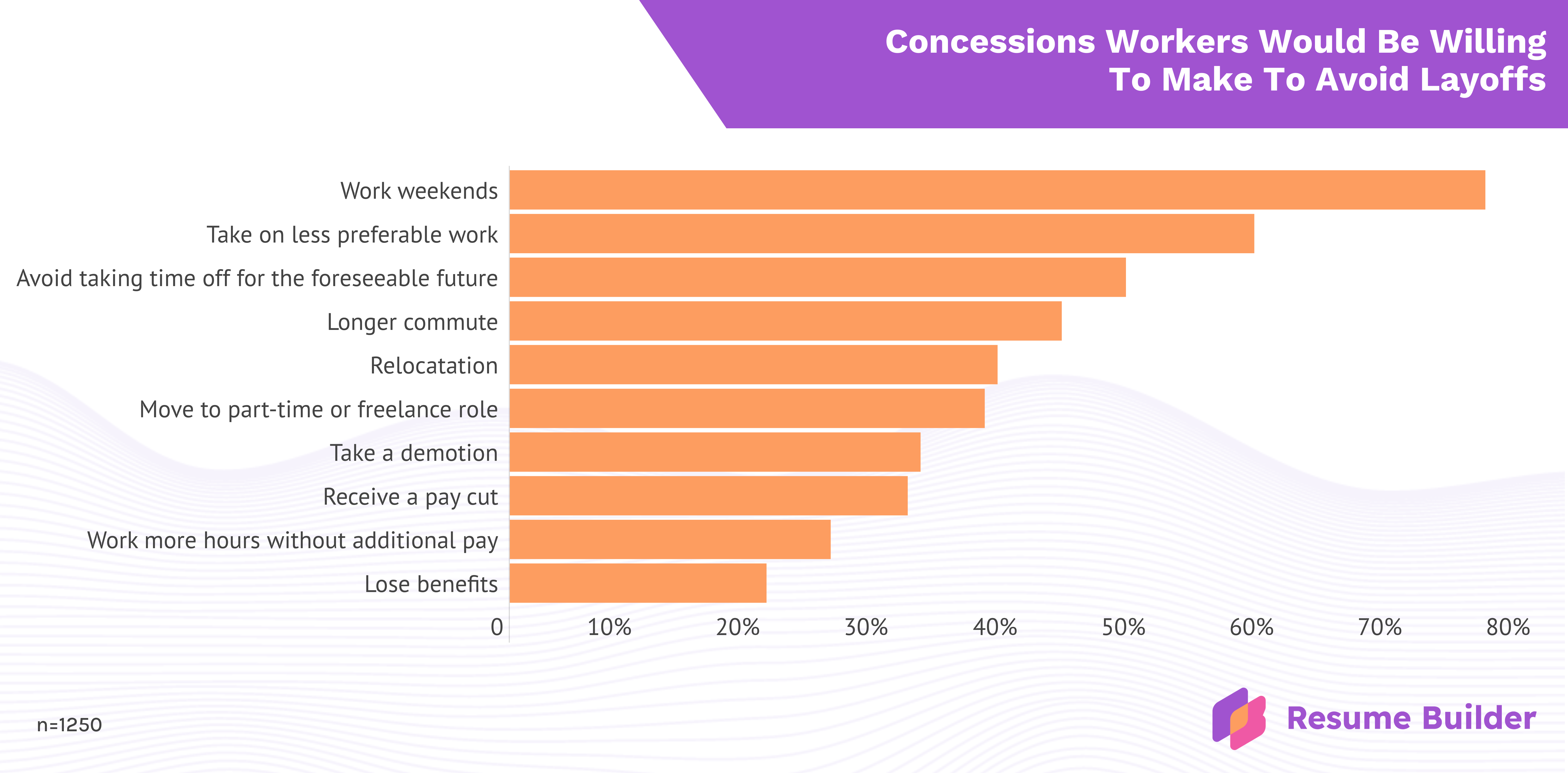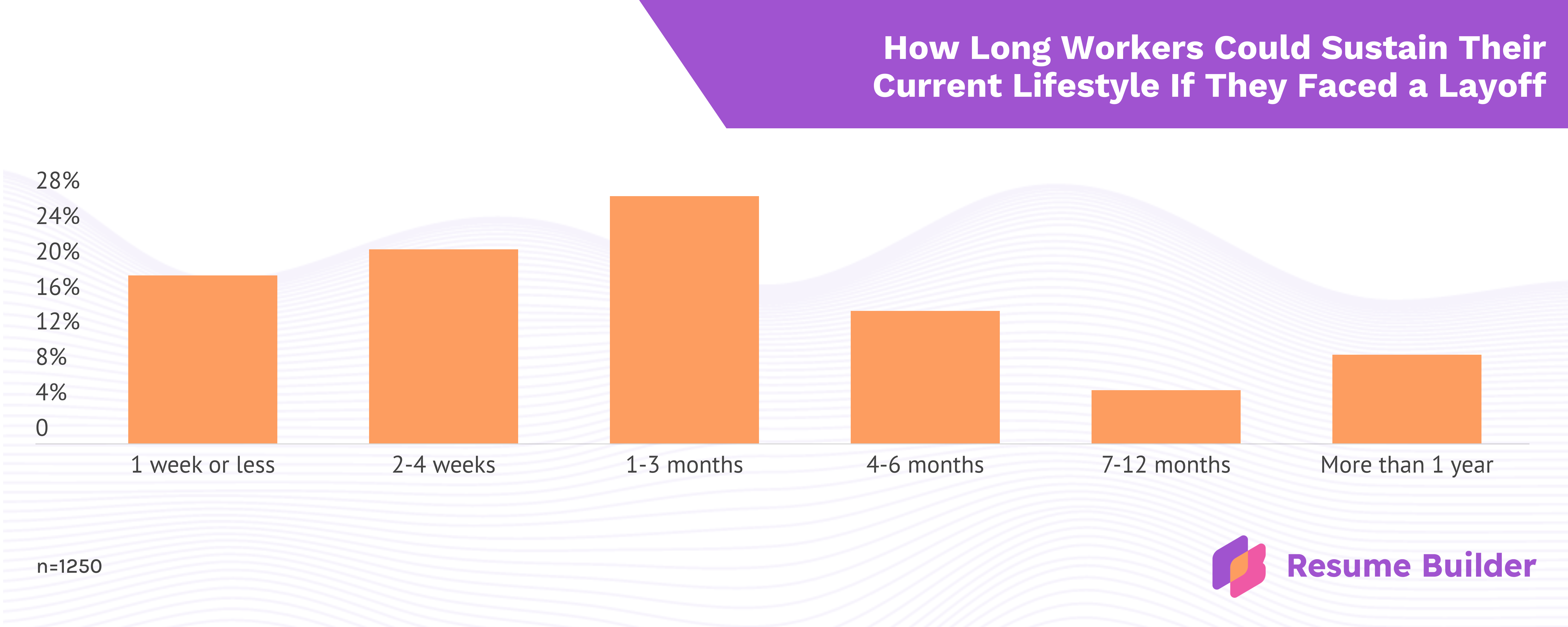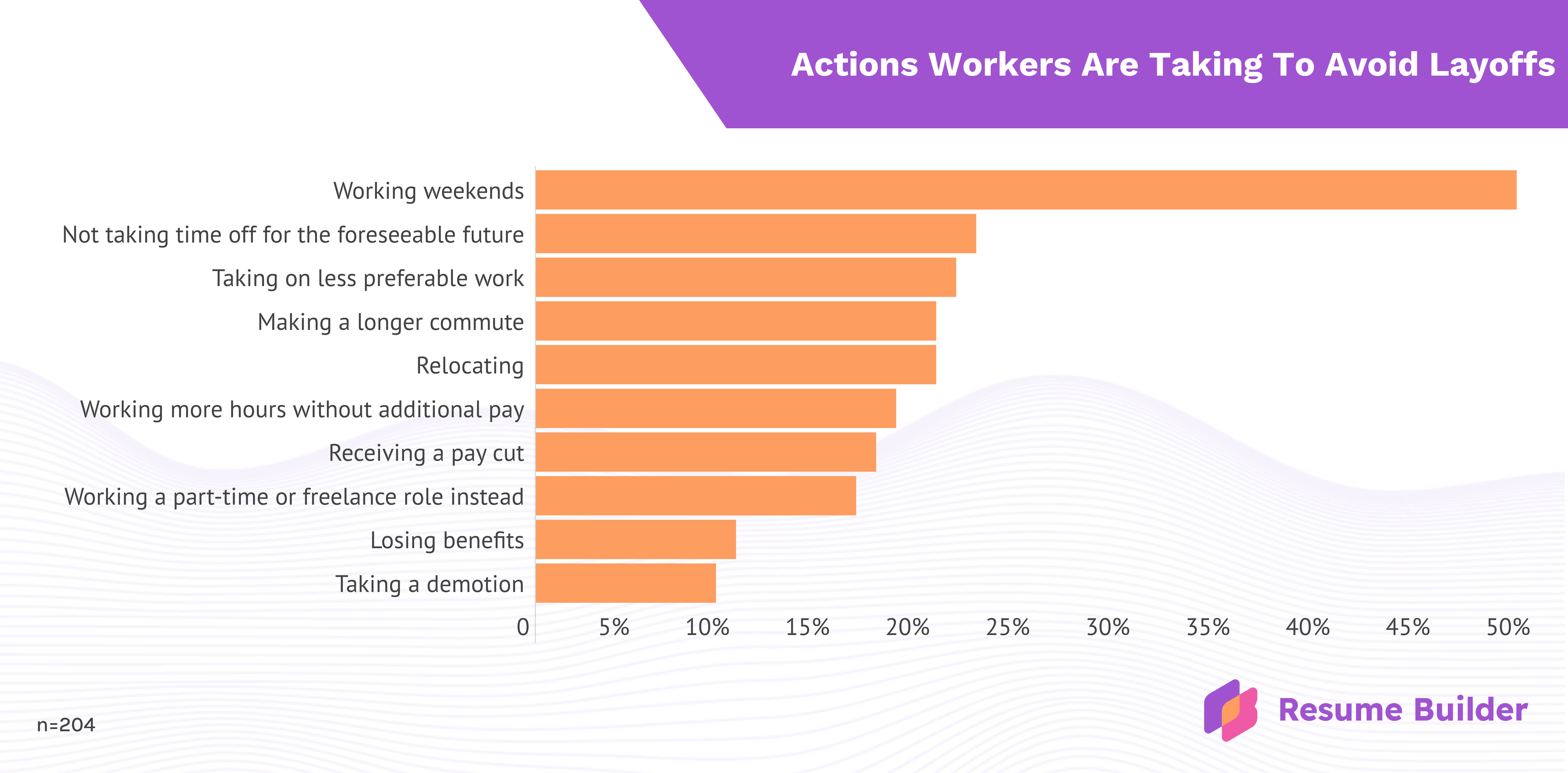Being laid off can have detrimental effects on workers who may receive limited severance payments and struggle to pay for basic necessities.
In June, ResumeBuilder.com surveyed 1,250 U.S. workers to understand how a layoff would impact them and what compromises they would make in the workplace to survive a potential cut.
Key findings:
- 32% of workers would take a demotion, and 31% would accept a pay cut to prevent being laid off
- 1 in 5 workers could only sustain their current lifestyle for a week or less if laid off
- Biggest concerns about being laid off include affording housing and losing benefits
- 1 in 8 workers have made sacrifices at their current workplace to remain employed
1 in 3 Workers Would Take a Demotion To Avoid Layoffs
Employees are willing to make compromises to avoid a layoff.
When asked what compromises they would be willing to make, 76% of workers surveyed say they would work weekends, 58% would take on less preferable work, and 48% would avoid taking time off for the foreseeable future. Additionally, 43% would accept a longer commute, 38% would relocate, and 37% would be willing to switch to a part-time or freelance role.
Finally, 32% report they would take a demotion, 31% would receive a pay cut, 25% would work more hours without additional pay, and 20% would forgo certain benefits.
Of those willing to take a pay cut, 28% indicate they would accept a 1% to 5% difference, 33% would take a 6% to 10% reduction, and 18% would receive an 11% to 15% cut. Another 10% are open to a 16 to 20% decrease, and 8% are prepared to take a pay cut over 20%.

“When facing a potential layoff, negotiating to retain your position, even if it involves a pay cut or longer hours, can provide valuable time to explore other options, such as seeking additional income or initiating a job search. Staying employed while you evaluate your next steps can offer stability and a clearer path forward,” says Resume Builder’s Chief Career Advisor Stacie Haller.
“Ultimately, taking proactive measures can help avoid the immediate impact of a layoff and give employees the opportunity to make well-informed decisions about their future career moves.”
Workers Are Most Worried About Paying Rent, Losing Benefits if Laid Off
When asked about their concerns if laid off, workers express varying levels of worry about different aspects of their lives. The greatest concern is paying rent or mortgage, with 48% saying they would be very worried and 31% saying they would be somewhat worried about this.
Losing benefits, such as health care, is a significant worry for 41% of respondents, and 30% say it is somewhat of a worry. Affording food is another major concern, with 40% being very worried and 37% somewhat worried.
Additionally, 33% of workers are very worried about disappointing their families, while 30% are somewhat worried. Finally, the prospect of having to find a new job leads 27% to be very worried, and 47% to be somewhat worried.
The majority of workers believe a layoff would negatively affect their mental health: 30% expect an extremely negative impact and 39% anticipate a negative impact. Conversely, 5% think it would be positive, and 3% believe it would have an extremely positive impact on their mental health. A remaining 23% feel it would have neither a positive nor negative effect on their mental well-being.
1 in 5 workers could only sustain their current lifestyle for one week or less
Of workers we surveyed, 19% say they could keep their current lifestyle for one week or less if they were laid off. Additionally, 22% report they could sustain their lifestyle for two to four weeks, 28% for one to three months, 15% for four to six months, 6% for seven to 12 months, and 10% for more than one year.
“Getting laid off can be a traumatic experience, particularly for those who are unprepared. The first step for a laid-off employee should be to take a moment to process what has happened and allow themselves time to plan their next steps.
“Start by understanding your immediate needs regarding benefits and the specifics of your severance package. Ensure you can secure good references from your former employer, and apply for unemployment benefits as soon as possible, as it may take time to receive your first check.
“Once your immediate needs are addressed, you can begin planning your job search and strategy. Taking the time to create a thoughtful and well-organized plan will help you navigate this transition more effectively and set you up for success in your next role,” says Haller.

1 in 8 Employees Have Made Compromises To Stay On
A number of workers (16%) have had discussions with their current employer about being laid off.
Of workers who have discussed layoffs with their manager, 80% (or 13% of the total sample) have made compromises to remain employed. More specifically, 49% are working weekends, 22% are not taking time off for the foreseeable future, and 21% are taking on less preferable work. Additionally, 20% are commuting longer distances, 20% are working in a new location, and 18% are working more hours without additional pay.
Finally, 17% took a pay cut, 16% are now working a part-time or freelance role, 10% lost some benefits, and 9% took a demotion.

“The best way for organizations to manage pending layoffs is through transparency and honesty. Employees understand that companies sometimes need to make difficult decisions that may adversely affect them, but knowing what to expect can help them prepare.
“Organizations that take proactive steps to redeploy at-risk employees into new opportunities are more likely to maintain trust and loyalty within their workforce. By being transparent about their plans and offering support, these companies can navigate layoffs more effectively and preserve their reputation in the eyes of their employees. They need to be reassured that if layoffs occur, those affected will be taken care of through a severance package. This approach fosters a more resilient and committed workforce, even during challenging times,” says Haller.
Methodology
This survey was commissioned by ResumeBuilder.com and conducted online by the survey platform Pollfish. It was launched on June 26, 2024. Overall, 1,250 workers completed the survey.
To qualify for the survey, all participants had to be over 18 and currently employed for wages.
For all media inquiries, contact [email protected].
